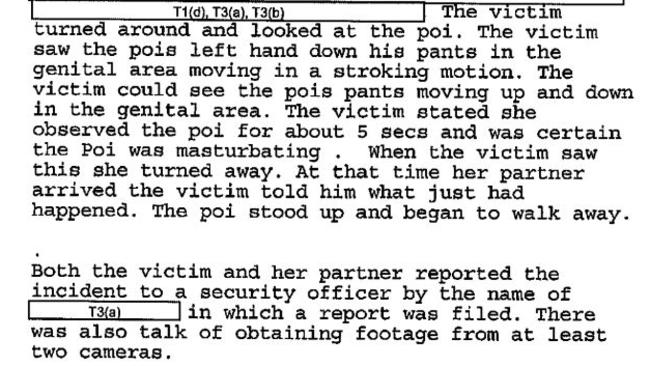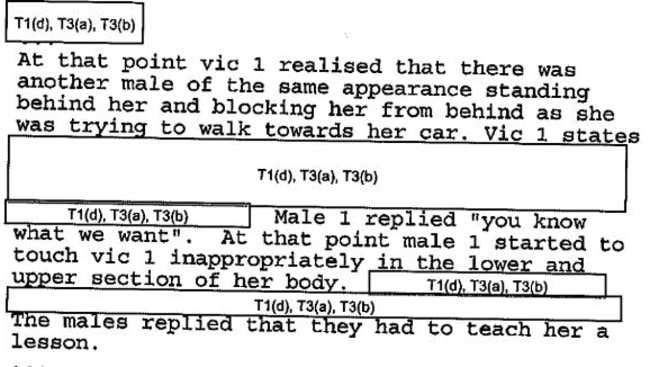Police reveal what the ‘secretive’ universities didn’t want you to know
THESE are the chilling stories our unis didn’t want you to read. Police reports obtained under FOI laws paint a terrifying picture.

CONTENT WARNING: Descriptions of sexual violence
INTERNAL police documents reveal what Australian universities have tried to hush up: A sickening number of rapes and sexual assaults reported to police, taking place on university campuses across the country.
Female students have told police of being grabbed at random, ambushed in campus carparks, raped in bushes, raped in their dorm rooms, masturbated on in libraries, and molested in university corridors, swimming pools and bathrooms.
In one case a woman at Macquarie University was tackled into the bushes and allegedly raped, before a number bystanders came to her aid, alerting police and ambulance services.
In another case, a student at Monash University’s Clayton campus reported to police that she woke in her dorm room at approximately 4.50am on a Sunday morning to find that she was being sexually attacked in her bed.
These are just two of dozens of incidents now made public by police. In total, more than 500 pages of internal police documents, cataloguing over 150 rape and sexual assault complaints at various Australian universities have been released.
The documents were obtained by Channel 7’s FOI editor, Alison Sandy. She sought the documents from police after numerous universities refused to comply with her earlier FOI request for a story that was aired on Sunday Night this year.
To work around these “more secretive” universities, Ms Sandy directly requested from police that they release all sexual assault complaints connected with the specific street addresses of those “less co-operative” universities. She also included a number of other universities from around Australia who did comply with the original FOI, but didn’t provide in-depth detail.
WHAT THE ‘SECRETIVE’ UNIVERSITIES DIDN’T WANT YOU TO KNOW
The documents expose chilling accounts of students being raped, detained against their will and violated. Almost all the complaints have been made by women.
At the University of Canberra, in at least two separate incidents in the past three years, female students have told police that — while walking on campus at night — they were ambushed: grabbed from behind and a hand was placed over their mouth, before being dragged away and sexually assaulted.
At RMIT University, a female staff member described to police how she was sexually assaulted in a female toilet on Level 3 of Building 37. The woman visited the bathroom prior to her 10am class but once inside the toilet cubicle she discovered that the door was broken and would not lock properly.
At that point, she claims she was sexually assaulted by a man who entered the toilet area. (RMIT has confirmed that a staff member was assaulted and that police were called who obtained CCTV footage of the area.)
In 2013, at Monash University, a male student was arrested by police for allegedly raping a female student following a fancy dress party at the student lounge.
These are just a few of dozens of similar reports contained within the police documents.
THE TACTICS AND RUSES USED BY OFFENDERS
The police data also sheds light on the disturbing ploys that offenders are using to bait victims and lower their defences.
In numerous cases, female students told police they were approached on campus by a stranger who initially feigned a benign reason for interaction — often by asking for something inconsequential: a cigarette lighter; road directions; the time; a handshake, etc.
Once engaged in conversation, the offender would then rapidly escalate contact, before assaulting the victim. (This pattern was evident across a number of police reports. These types of offences took place in both daylight hours and at night.)
In one terrifying case, a student from Macquarie University said she was walking back to her car in the evening when a man approached, asking her why she was walking on campus alone at night, and insisting on escorting her to her vehicle. She declined, only to realise that another man was standing behind her, blocking her exit.
According to the police statement, the pair of men then allegedly sexually assaulted the woman, speaking to one another in Arabic, and telling her in English that they needed “to teach her a lesson”, saying “you know what we want”.

In another chilling incident, a female student was walking through a Sydney University carpark in 2014, when she was set upon by a stranger. The police record states:
“As [the victim] walked approximately 10 metres into the carpark the Person Of Interest turned towards the victim, grabbed the upper part of her left arm and pulled her in towards him in an attempt to kiss her. The victim yelled ‘Hey, No No No’ and pulled her face away from him.
“As this happened the POI grabbed the victim’s face and covered it with [his] hand and pushed her in between two cars. The victim yelled at the top of her lungs for help [and] used her free right arm to push the POI away from her.
“CCTV footage provides [an] excellent shot of the POI’s face, suitable for identification. In the event that he is not identified, police will consider a media release. The footage depicts the actual offence taking place, and is quite shocking. It would have a strong appeal to television news networks.”
A disturbing number of female students also reported strangers using conversational ploys before exposing themselves and masturbating on campus, particularly in university libraries.
Police arrested one man who followed a woman out of Sydney University law library as it closed, stalking her around campus masturbating. When police located him later that evening, still on campus, he was wearing “a distinctive pair of prison issued green sneakers”.
Another student at La Trobe University was feeding ducks in the pond when a man in a vehicle stopped to ask directions. But upon nearing the car, she saw the driver was masturbating and pant-less. (He was described as Caucasian, mid-40s, balding, wearing glasses, but no pants.)
Other offenders used technology to lull female students into innocuous conversation prior to assaulting them.
In two cases, female students reported being raped on campus after men they met through the Tinder app arranged to meet up at a campus location (including a dorm room in one case, and Melbourne University gates in another).

BETRAYAL: FALSE FRIENDS AND BROKEN TRUST
Read as a whole, the police incident reports paint a frightening picture of the levels of sexual violence and harassment that young women face on university campuses around our country.
But the greatest source of concern for young women — as highlighted in the documents- are acquaintances and those individuals already known to victims.
In one case a man was arrested at La Trobe University Bundoora campus, after he and a friend had been hanging out drinking together in her bedroom.
During the night, a neighbouring student heard the victim yelling out “Stop” from her dorm-room. Upon investigation, the witness found her naked and crying on her bed and the accused half-dressed and leaving the bedroom. (Police were called, and the woman transferred to hospital).
In another alleged rape, police investigated after a young woman claimed that her “friend” of two months, sexually assaulted her in his dorm room following a college party. After kissing on the dance floor and moving to his bedroom, she told him she “wished him to stop and did not want to have sex” but vaginal penetration occurred regardless.
Sharna Bremner from End Rape on Campus Australia says that “university aged victims are far more likely to have been assaulted by someone they know, but are less likely to report that type of assault. This is often because they fear they won’t be believed; they don’t recognise the incident as rape when it’s someone they know; or because they hold concerns that mutual friends may ostracise or blame them, or side with the offender.”
“A significant number of sexual assaults are occurring in campus housing. [For these young people,] understanding consent is vital and at least some of those acquaintance assaults could potentially be prevented with better consent education” she said.

DON’T WAIT TILL SOMEONE IS RAPED
Despite the continued advice of various experts, some university residences are still reluctant to implement consent training as part of their broader welfare education programs.
New data out today indicates that while some university residences intend to run some consent education training for next years’ students, only around 30 of the 217 residential colleges in Australia say they will involve suitably qualified expert services in the training.
The data was obtained by community campaigning group, Fair Agenda, who launched a survey in September this year, asking all residential colleges if they plan on providing training in sexual consent and preventing sexual violence.
“We’ve heard from students and parents who want to know what action is being taken to reduce sexual violence at universities” said Renee Carr, executive director of Fair Agenda.
The results show that of the 217 residences, 87 have indicated that they will provide at least some training for some students, but only around one third of that number will meet best practice guidelines.
(A further 130 residences either stated that they did not intend to provide training, were unwilling to participate in the survey, or are yet to complete the survey. News.com.au spoke to a number of colleges who stated that they did not perceive sexual assault as an issue at their University institution. Others stated that they resented the “implied threat of exposure” inherent in the survey. Various others have requested more time to research options before completing the survey which Fair Agenda has allowed.)
Ms Carr says that it is encouraging that residences are increasingly offering sexual assault and consent training, but that there is a danger that if that training is not delivered by experts, it can confuse students, contribute to misinformation, or leave students with the mistaken perception that victims or alcohol are to blame for sexual violence.
Ariel, a 21 year old student and rape survivor from the University of Melbourne agrees.
“The first ever time that my college spoke to us about consent at all, was the year after I was assaulted. It was a reaction to me [being] assaulted” she told news.com.au.
“It’s so important to do [training] proactively, rather than reactively. You can’t just wait until someone comes forward saying they have been raped. What about all the people who don’t say anything at all?” she said.
“It [also] has to be done in the right way. It has to be [delivered] by people who know what they are talking about. We had someone [from the university] come to college to talk about consent, but she did it in such an out of touch way that it actually became a joke.”
“She told us to leave our phones behind or turn them off when we go clubbing [which is not realistic for people our age]”.
“She put her hand on someone’s shoulder [to make a point about unwanted affection] and for the next few days whenever someone touched someone’s shoulder [around the college] people would squeal ‘Stop! Sexual harassment!’. It became a joke.”
A representative of Rape and Domestic Violence Services Australia said that “there is risk that training could actually be harmful [if delivered by unskilled or unqualified presenters]. Training programs should factor in the likelihood that a percentage of participants will be survivors of sexual assault [and as such] trainers with expertise in sexual assault trauma are far better placed to [deliver training] and respond to anyone who is adversely impacted by the content.”
The spokesman also confirmed that their training arm (The Full Stop Foundation) are scheduled to run training sessions at specific colleges at Melbourne University, Sydney University, UNSW, and Wollongong University in 2017.
Residences at ANU and University of Canberra have also indicated that Canberra Rape Crisis Centre will be running similar sessions at a number of their residences.
If you or someone you know has been impacted by sexual assault, support is available by calling 1800 RESPECT and asking to be transferred to a trauma-informed counsellor.
To see the full results of the Fair Agenda survey visit www.fairagenda.org
STATEMENTS FROM UNIVERSITIES:
Multiple Universities mentioned in this article were contacted for comment.
Sydney University and Monash University both received and opened the email but elected not to respond by deadline.
La Trobe University responded via phone and indicated that they hold genuine concern for victims referred to in this article and are working on multiple fronts to address the issue of sexual assault.
Macquarie University:
Macquarie University is committed to providing a work and study environment underpinned by values of dignity, respect and inclusion free from all forms of harassment and assault, including sexual assault. Violence of any kind is not tolerated anywhere on our campus and the safety and welfare of our students and staff remains our number one priority.
University of Victoria:
The University’s protocol for responding to crime, including any form of sexual offence, is to immediately contact police.
VU has a zero-tolerance policy to sexual assault and harassment and gives such incidents the highest priority. The University is dedicated to preventing and responding to sexual assault and harassment.
This year the University established Safer Community, a central point of inquiry, response and support for concerning, threatening or inappropriate behaviour.
University of Canberra:
The University of Canberra is committed to a culture of respect and safety on campus and we have a zero tolerance approach to sexual harassment or assault. When assaults have been reported on campus, we have fully co-operated with ACT Policing. We have partnered with most other Australian Universities in the Respect. Now. Always. national campaign which aims to prevent sexual assault and harassment in universities. This campaign builds on longstanding work at the University of Canberra and across the Australian university sector to prevent sexual assault and harassment on campus and ensure that services are in place to support students when they need it.
RMIT:
The University is distressed that a female staff member was assaulted while on campus.
The incident took place on 19 October 2012.
Security responded promptly, as did Victoria Police. The police sourced CCTV footage from the area.
The staff member had access to counselling and welfare services.
University of Melbourne:
The University takes every opportunity it can to promote the initiatives and safety policies it has in place, but acknowledges there is more to be done to ensure that the institution and the entire sector continues to learn from best practice approaches to these issues. As an institution we continue to work closely with nearby residential colleges to ensure appropriate support and guidance is provided to our students.
The University has taken a lead in a range of wellbeing and safety initiatives. These include the Safer Community Program and the Australian-first ‘UniSafe’ app, a free phone app that provides emergency contact details and safety information for all members of the University’s community.




